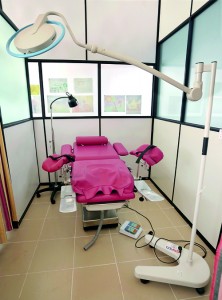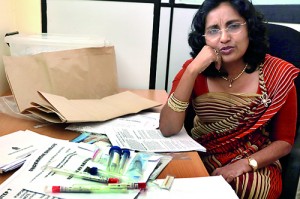Where victims won’t fear to tread
She stands in the state-of-the-art ‘examination suite’ with a comfortable bed in a muted red close by and goes into the minutest detail about how they are attempting to achieve a two-pronged goal for “victims” or “survivors” of sexual assault.
From the sign above the door to the curtained cubicle in the centre to the attached bathroom, it is obvious that what has been considered is the best-interest of these victims, be it a child, woman or man.

The modern examination suite
Opened on January 9, the ‘Sexual Assault Forensic Examination (SAFE) Teaching-Training Unit’ comprising the examination suite and mini-laboratory set up with assistance from USAID, seems like just another innocuous room off a hall where men, women and children have gathered for varying services at the Ragama Medical Faculty of the University of Kelaniya, located behind the North Colombo Teaching Hospital.
The opening was graced by Attorney General Palitha Fernando, Kelaniya University Vice Chancellor Prof. Sarath Amunugama, North Colombo Teaching Hospital Director Dr. Roy Perera and high-level officials from the Health Ministry, judiciary, AG’s Department, Police, hospital and university.
This has been a dream come true for Senior Lecturer and Head of the Department of Forensic Medicine, Dr. P. Anuruddhi S. Edirisinghe. Through this she has not only put in place, the collection of forensic evidence in a systematic and professional manner to prevent possible contamination but also a thorough teaching and training environment for both specialists-in-the-making as well as medical students. (See box)
The concept has become reality due to the efforts of the Dean of the Ragama Medical Faculty, Prof. Nilanthi de Silva, Senior Lecturer in Forensic Medicine Dr. Indira Kitulwatte and Consultant Judicial Medical Officer of the North Colombo Teaching Hospital, Dr. Keerthi Gunatilleke who supported me immensely, says Dr. Anuruddhi.
As one steps into the unit, a rack full of brightly-coloured soft toys and other toys will surely put at ease the little ones who may walk in after the major trauma of sexual assault.
Since it was opened, two victims have been sent here, both around 15 years old. One heavy with child, had allegedly been raped by a so-called friend of her brother. The alleged perpetrator, himself a familied man, had been a trusted visitor in their home, the Sunday Times learns.
In the case of the other girl, it may have been a “crush” which led her astray from home, with a 21-year-old who has a reputation in the area for substance abuse. The desperate parents had brought her back home, as she was bright and first in her class, pleading with her to at least sit the Ordinary Level examination.
As Dr. Anuruddhi explains the work of the unit, her passion and concern for the voiceless victims of sexual assault are evident.
No one will realize that adults and children who walk in here are victims of sexual assault as that carries with it much stigma, she says. Nowhere is it obvious because it is hidden within the acronym ‘SAFE’, she points out, explaining that the logo depicts a man, woman and child within the protection and under a magnifying lens – the trademark tool of forensic pathologists.
Forensic pathologists also known as Consultant Judicial Medical Officers (JMOs) pave the way, by collecting forensic evidence, for the victim to get justice before the law, by providing an indisputable trail back to the perpetrator.
Now with ‘rape-kits’ available in all major hospitals, provided by USAID from August last year (2013), their job has been made easier, according to Dr. Anuruddhi.

A better deal for victims is Dr. Anuruddhi Edirisinghe’s goal. On the table is a ‘rape kit’. Pix by M.A. Pushpa Kumara
However, unlike JMO offices which have only basic facilities to handle not only sexual assault cases but also a gamut of other areas, the SAFE Unit is aspiring to a different goal. It provides coverage for Ragama, Kadawatha, Wattala, Kandana, Ja-ela, Sapugaskanda, Meegahawatte, Kiribathgoda and sometimes also Kelaniya.
Referring to the process, she says that when anyone lodges a complaint of sexual assault with the police, they would produce the victim before a JMO for a medico-legal examination and reporting. It is the duty of the JMO to take the case history as well as perform a thorough examination and collect “trace evidence and photo documentation” for the court hearing which would help put the perpetrator behind bars.
The moment we get such a victim at the unit, we would gently take the case history after obtaining informed written consent so as not to re-traumatise the victim. It is not a few minutes’ job, reiterates Dr. Anuruddhi , adding that the whole process would take several hours. “At this point, we are not only collecting evidence but we are also the first doctor that the victim is brought to and it is our duty to check out the victim’s health needs and refer the victim to all other doctors that she or he may have need of.”
Citing the example of a girl who has been raped, she says that they would direct her to a Paediatrician, an Obstetrician and Gynaecologist and depending on her psychological trauma call in a Psychiatrist. The collection of trace evidence would begin with a large thick brown paper from the rape-kit being spread on the floor and the victim shedding her/his clothes onto it. Then wearing a hospital gown, the victim would be weighed, height taken and a close examination performed from head to toe, including the genital areas.
All the tools needed for the collection of samples such as blood, urine, other bodily fluids as well as any material under the finger or toe nails are in the rape-kit. Even a fine-tooth comb to sift through bodily hairs is included, she says, adding that all the collected evidence would then be sent to the Government Analyst’s Department.
The importance of proper lighting when examining the victim is stressed by Dr. Anuruddhi as even a mild bruise or slight pressure-bump would be of vital evidence.
This is why the SAFE Unit is hoping to provide the dual benefit of health care and justice to victims of sexual assault.
| Well trained young docs a must
With sexual violence being identified as a major public health issue and the reported cases of sexual abuse especially those involving children on the rise, Dr. Anuruddhi Edirisinghe underscores the need to train young doctors. For a good quality medico-legal examination of sexually assaulted survivors a sound knowledge, fine skills of examination, interpretation abilities, backed by scientific reasoning as well as adherence to medical ethics and standards are needed, she says, pointing out that the doctor also needs to be guided by the principles ensuring the rights of individuals such as right to health care, right to human dignity, right to non-discrimination, right to information as well as right for self-determination. The teaching-training at the unit will be provided by the six Specialists in Forensic Medicine attached to the North Colombo Teaching Hospital in a gender and cultural sensitive manner. They are Dr. Anuruddhi, Dr. Indira, Dr. Keerthi and Dr. Nirmala Perera, Dr. P. Paranitharan and Dr. Priyanjith Perera of the faculty’s Department of Forensic Medicine. Though the unit is mainly for undergraduate and post-graduate medical education relating to sexual assault forensic examinations, workshops for others who are part of the judicial process such as lawyers, law enforcement officers and child care officers are on the cards. With plans to make the unit internationally-recognized for forensic medical education, services and research, the next step is to develop a good information system, says Dr. Anuruddhi, adding that the Health Ministry has been requested to support the Office of the JMO, North Colombo Teaching Hospital in this area. |


